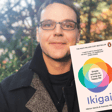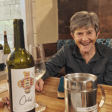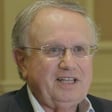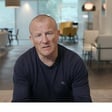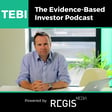Introduction to 'Second Lives'
00:00:03
Speaker
I'm Jonathan Holloway. Welcome back to Second Lives, a series of 12 podcasts for the evidence-based investor looking into how lives can take a new direction.
00:00:13
Speaker
Given that the theme of this series is second lives, many of my interviewees have made the transition to a new or different life in their 40s or later.
Scott Morehouse's Transition from Athlete to Planner
00:00:23
Speaker
But this month it's all different. My guest today, Scott Morehouse, was a Paralympian athlete and his first life peaked at the London 2012 Olympics when he was only 23.
00:00:36
Speaker
He's now the father of twins and a chartered financial planner for the firm that has generously supported this series, Mulberry Bow. In a very open and honest interview, you'll hear Scott talking about being tapped on the shoulder to become a Paralympian, his take on ability and disability, making the king jealous by kissing now Queen Camilla on the cheek,
00:01:00
Speaker
and what it was like to not get an Olympic medal, and how he made the transition to a new life in his mid-20s. But just before we roll this interview with Scott, I should just say a little bit more about Mulberry Bow. This podcast is brought to you in collaboration with them. They are a very different chartered financial planning boutique in the city of London, one that offers a highly personalized service to around 150 individuals and families.
00:01:30
Speaker
Robin Powell and I like the fact that the team at Mulberry Bowe do not have sales targets nor their own financial products to sell. As they like to say, they sit on your side of the table. For more information, just Google Mulberry Bowe wealth planning or follow the links in the notes for this podcast. So now to Scott Morehouse.
The Art and Technique of Javelin Throwing
00:01:57
Speaker
Scott, this is a unique opportunity for listeners to understand what a thought through and technical process it is to throw a javelin at a world class event. Are you able to break it down into the different stages you had to learn and practice and fine tune?
00:02:13
Speaker
Yeah, javelin is a very technical event and so whilst most people are probably used to throwing a ball or a cricket ball of some sort, if you try to do that with a javelin you'll end up seriously hurting yourself. I think in terms of the the actual throw itself, you know a lot of people think you might throw with your arm
00:02:34
Speaker
But actually, you know, you don't. I mean, you might do any first style, but that's certainly not how you end up learning to throw far. Really, the throw comes from the ground upwards. So it comes from the velocity that's that's accumulated through through running, you know, and the sort of job you sort of the next time you see somebody throw a javelin, you'll see what I mean. There's sort of three phases to it. There's the run up the approach, if you like, where people are generally sort of face on running with the javelin above their head.
00:03:00
Speaker
they transition into the crossovers so when they're then moving sideways laterally and then the last piece is almost like a mini jump into a plant and then the idea is that you carry the momentum and the velocity that you've built up throughout those phases into the throw so that you plant with one side and accelerate with the other side and it all comes from the hip
00:03:24
Speaker
up through the body and you know your arms meant to be like a whip really like a bit of spaghetti that effectively the javelin just whips off. What I'm fascinated by is the fact that you make it sound like it has to be an instinctive process but presumably in order to succeed you must be consciously living each step of it and knowing whether you've done it right and how you can improve it.
Achieving Effortless Performance in Sports
00:03:50
Speaker
Absolutely you know I think
00:03:52
Speaker
athletes are very purpose-driven individuals and they're very focused on big goals. But part of that, of course, within training, you have many goals and many parts of the throwing process that you're working on. And some technical aspects, you might crack them in a session, could take you a couple of sessions.
00:04:14
Speaker
other technical aspects you could be working on for an entire season. It really depends what that is, and obviously that's individual to everybody. The ideal performance is one that's effortless, because if you get it right, if you time all those things up correctly, then when you throw, it actually didn't feel like you throw. And you can compare that to other things. People talk about it if you play golf.
00:04:36
Speaker
when you crack the ball really well, often the timing's been spot on and you haven't felt like you've hit it. And if I'm honest with you, then the sad thing is sometimes when you see interviews afterwards and you hear athletes say, oh, I hit it that far or I did this and I didn't even feel like it, because we've been conditioned from such a young age that the effort and almost tension equates into
00:05:02
Speaker
outcome. The harder we try and the more that we tense and feel what we're doing, the more that lends itself to a better outcome. But in reality, it's actually the other way around. Generally, when you don't feel it and you don't do those things and you don't tense and you just let things happen organically,
00:05:19
Speaker
That's when it tends to work in your favor. And you were striving for that mastery. I mean, we'll talk through the kind of stages of it, but obviously a massive highlight was London 2012, the Paralympics, you know, this amazing atmosphere in the home city. I'm curious as to whether you were able to feel any of that or enjoy any of that, or whether you were so focused on that mastery in your task.
The Emotional Weight of the 2012 Paralympics
00:05:47
Speaker
that it all kind of washed by and passed you by. You know, I think you hear amongst a lot of athletes that have competed at a game, which is generally the pinnacle of sport, of your sport, you know, if you're athletics or if you're in cycling, for example, and this is something like the Tour de France, but generally the Olympics is what you're aiming for.
00:06:07
Speaker
And a lot of athletes, I think it's fair to say, and I've heard people say, would trade A games or two to have a home games because being at home in front of a home crowd really is that extra special. So there's a weight that comes with that. There's an expectation level on yourself. There's a weight with wanting to do well.
00:06:29
Speaker
in front of a home crowd as well that certainly you know is something you have to contend with. I just remember getting on the bus to go down to the warm-up track and it was probably the biggest feeling of intensity that I've ever felt emotionally you know you're sort of
00:06:47
Speaker
Yeah, you're nervous, you're apprehensive, but you're excited. This is the moment you'd be waiting for, but there's a lot of emotions all rolled into one. And I think if anybody had asked me to talk to them, I probably would have thrown up. That's the sort of level of intensity that we're talking. And I remember Matthew Pinson, obviously famous rower,
00:07:07
Speaker
And I think in one of his books, he talks about from Sydney, where he talks about getting to the start line and he says, hearing an ambulance and just thinking, I wish the bus we were on would crash and the ambulance would be for me. Behind all this, right at the beginning of your life, before you can even remember it, I believe, you lost your lower leg and you've been very open about how that happened. Can you tell the listeners how that happened?
Resilience Born from Tragedy
00:07:36
Speaker
Absolutely, yes. So I was six weeks old and my real father poured hot water from the kettle and unfortunately did some pretty significant damage that resulted in me having my leg amputated a year old.
00:07:54
Speaker
I think the natural question people wonder or ask is, well, he surely didn't do it on purpose. Unfortunately, sadly, he was convicted and he spent some time in prison as a result of it. I guess the flip side of all of that is that it happened to me at a very young age. I don't remember the incident. I don't remember life before because I was so young.
00:08:19
Speaker
I've always grown up from day one with a left leg through knee amputation and had to learn how to do everything from day one. So I don't have that comparison, which some people have that lose limbs later on in life, most bike accidents, military. So I'm very fortunate from that perspective.
00:08:39
Speaker
This is Jonathan Hollow and you're listening to Second Lives. I'm interviewing Scott Morehouse about what it takes to start as and develop as a world-class athlete. You said you work with military veterans who've had a, you know, obviously different experience of loss. Yes, I
Life After Injury and Helping Veterans
00:09:00
Speaker
I worked for a while with a firm called Amputees Action and effectively they did casualty simulation work with the military. It serves a few purposes really, I suppose. Firstly, the serious aspect of
00:09:19
Speaker
of training for the military and trying to make it more realistic. I think previously what would happen is they'd choose someone in the squadron platoon whenever that day and they were going to be the injured party and you'd write on their forehead your arms blown off or your legs blown off and it wouldn't be very realistic and so the whole point of this was that the first time that some of the soldiers might experience
00:09:40
Speaker
somebody with an amputation and how to maneuver those people in a pretty threatening environment wasn't the first time that they come across it. Effectively, we would get made up with special makeup and look like we've been blown up and we'd get placed in certain
00:10:02
Speaker
certain scenarios where we'd get a cue, it would be the big 50 cal going off and that would be our cue to come out and scream and shout and pretend that we'd just been injured and then there's a whole process that they have to go to repatriate you.
00:10:20
Speaker
That was the practical side of it, but of course the mental side of it as well was about sitting down with the soldiers and just letting them know what life is like with an amputation. And unfortunately, there's a lot of myths and there's a lot of things out there that people hear that aren't necessarily true. And so some of it's about giving them, I suppose, giving them hope as much as anything else that in hopefully the event that
00:10:47
Speaker
in the unlikely event that they do get seriously injured, that actually life after injury is pretty fulfilling and can be pretty fulfilling. I want to explore language a little bit with you.
The Power of Language in Disability
00:11:00
Speaker
Paralympian is a very positive word. People be very proud to say that word.
00:11:06
Speaker
disabled is a much more problematic word. So I'm just interested in your views on how to get language right and which words kind of work best for you to talk about your abilities and any limitations if you consider you have any limitations. Yeah, I think, you know, John, it's already interesting. It's already an area because the language change changes a lot. And I remember growing up
00:11:33
Speaker
the language was a particular way and the language now has changed. And I suppose that's not just about disability, it's about a lot of areas of life. And I think often what I find with these, with terminology is that it satisfies our human need for simplicity and categorization of people and put people in boxes, but often messages get lost within that. So for example,
00:12:03
Speaker
Often what happens is that the focus point becomes on the disability or the impairment and actually what gets lost is the athlete and the person behind it that's driving their successes.
00:12:17
Speaker
You know, you probably would have heard a lot around the sort of arguments with the blades, you know, and having gotten advantage or disadvantage and also the stories, obviously his story, well-known and obviously sad, the way that that played out. But, you know, he did a lot of sort of participatory sport for the Paralympic movement in the sense that he was the first guy to compete in the Olympics as well as the Paralympics. But obviously there was a lot of controversy around the blades that he wore and whether that gave him an advantage.
00:12:46
Speaker
I think the evidence on that isn't completely conclusive. There's clearly advantages in some areas, there's disadvantages in other areas. How do you put down the scales and weigh one up and which one? What's the net result? It's difficult at this point to say. But in all of that, what gets lost is the fact that he's a phenomenal athlete. The fact that if it was a case that you just put some blades on and off you go and you run very fast times, then of course everybody would be doing that. And that's not the case.
00:13:11
Speaker
And often I find with these seminologies that get used, it's those things that get lost, the essence of the person behind this ability and naturally. I'm an athlete that happens to have a leg missing. I did Lanza and John Nick Roats a couple of years ago on my own, 900 miles in seven days. I was just Scott Morehouse doing that and I just happened to have a leg missing. That's kind of how I view it. But yeah, I guess Paralympian, you could settle with that, I suppose.
Scott's Beginnings in Sports
00:13:41
Speaker
Let's talk about your, your sporting journey and how it began. Cause I believe it began with basketball and indeed with Jay blades of the repair shop. How did that come about? Yeah. So I used to play last fall when I was growing up and basketball was one of those, one of those things. And, you know, I, I grew up in sort of Marlow Henry on Thames way.
00:14:04
Speaker
And I, you know, went to any college and I have friends that were from from Lyricum and Jay did a lot of work in the community there helping people from disadvantaged backgrounds that perhaps, you know, needed something positive in their lives to focus on and basketball was one of those things amongst many things actually that he did. And so, yeah, I saw he actually used to be my basketball coach and
00:14:30
Speaker
Yeah, me and some of my friends and, yeah, I made a big group of friends and ended up creating a basketball team called Street Dreams. And we, yeah, we played, you know, prison teams and all sorts of teams. And I guess really it's just shows the sort of power of sport, you know, the power of sport in on many levels. I think sport is less about the thing that you're doing and more about
00:14:57
Speaker
the lessons that I learned and about bringing people together and overcoming obstacles. For some people, it's getting them away from some of the perhaps the less positive things that are going on in their life. Street Dreams was definitely that role for a lot of people in the community where I played. Yeah, it was pretty incredible. Jay's reinvented himself and now is on the repair shot, which is great to see.
00:15:28
Speaker
And so at that point sport was a relaxation and a social interaction, but not a profession or an obsession. Yes. I think, you know, some people sort of grown up, I think being quite active and, you know, always having sport at life. And that was certainly me. I think I just never had a particular sport to focus on my time and energy and efforts. And,
00:15:56
Speaker
I got picked up through a talent spotting day just off the Beijing in 2008 with London being a home game. There was a lot of money, a lot of investment put into finding talent that could essentially go on to represent Great Britain in London and have the potential to medal.
00:16:15
Speaker
And, you know, I benefited from that. So in 2008, I was working telecommunications, selling network test equipment, which I won't bore you with the details of it. I knew anyway that I wasn't going to do that for the rest of my life. But I, you know, I was humming hard about going to university or not, decided to get some real life experience. That's how that came about. But my boss at the time had heard about a talent spotting day that was taking place in my
Balancing Studies and Sports
00:16:45
Speaker
knew that I loved sport and gave me the day off actually I'm not sure whether he was trying to get me out of the business or not but gave me the day off and I tried my hand at a number of sports.
00:16:54
Speaker
athletics being one of them, but there was a few other sports as well where I was asked to come back for further trials. But you know, athletics was probably where my passion was. Growing up watching athletics, effectively, I went through a selection process over six months at Loughborough and whittled down to the last turn of the country and then put on a fast track development program.
00:17:17
Speaker
and had an accelerated journey through the sport. Athletics and in particular throwing is such a dynamic sport in terms of the training that you do. You only throw a javelin twice a week. You're sprinting, you're throwing, you're doing plyometrics, you're in the gym, you're lifting. You do all sorts of things that it keeps it very refreshing.
00:17:43
Speaker
Now for a word from Mulberry Bowe who have collaborated with us to develop this series. I spoke to Simon Bullock of Mulberry Bowe. What does he do to build the culture of trust needed between his firm and its clients? That's a good question. I mean, it's not by accident that one of our opening lines on our website is it's all about trust. I suppose it helps that our clients come to us through
00:18:09
Speaker
a referral from a friend or a family member or perhaps an existing advisor. And clients also understand that we're a childhood firm and we're completely independent. There's no products for us to sell even if we wanted to.
00:18:22
Speaker
I think it's important that our advisors have no sales targets. They focus solely on what's important to the client. But inevitably, once a client is actually working with us, we need to walk the walk, so to speak. I think we've all seen and come across firms that maybe roll out the red carpet initially to win the client's business, but then they don't deliver.
00:18:44
Speaker
We consistently look to do the opposite. We prioritize existing clients above all else and, you know, perhaps reflecting that after eight years in business, we've not received a single customer complaint. Thank you. That was Simon Bullock, the founder of Mulberry Bow. And now back to Scott Morehouse to talk about his journey through sport and life as a Paralympian athlete.
00:19:10
Speaker
So you followed them from this trial by, as I understand it, you started to degree, but not long after that, you were effectively a full-time professional athlete in preparation for Paralympics.
00:19:25
Speaker
Yeah, so as a result of being picked up through the Talent ID program, I had actually been missing formal education at that point. So it seemed like a natural pairing for me to go to university, get a degree at the same time as Bach on my training journey. And so I did two years full time at the University of Essex and then deferred my last year
00:19:54
Speaker
And then after London, I picked that up part time over two years, um, to finish it off.
Training for the 2012 Paralympics
00:20:00
Speaker
Yeah. The university was very good about it. We got to 2010 and I did a couple of international competitions at world under 23. So I came away with a silver medal in that. And then in 2011 in January, I was invited to my first senior competition in New Zealand for the world championships.
00:20:23
Speaker
And that was really the turning point, really. You came off in the world there, is that right? Yeah, so I came forth and I didn't go with big expectations. And so after I came forth,
00:20:40
Speaker
I remember I came off the track and the head coach just walked me around and said, London's sort of 16, 18 months away. You think you've got the ability to get there and perform well, but you need to make some changes. And I have to effectively make the decision to leave my coach and Manchester, give up my degree or defer my last year, move to London. And I joined training groups.
00:21:12
Speaker
It was a very high standard group that I was in, and I was very fortunate at such a young point in my career to have had access into training with those kind of individuals who, many of them had been doing their sports for 10 to 15 years as athletes, a much younger age than me. They knew themselves very well, and a big part of becoming
00:21:41
Speaker
a sports person in any sport is about understanding yourself. And that's not just from what works and what doesn't work in terms of the training, but also the mental aspect of sport, which is a large part of it. And inevitably, there'll be ups and downs in sports, and it's how you are able to deal with those things. You learn a lot about yourself as part of that journey, and that's why it takes a while to become
00:22:07
Speaker
You know the best version of yourself as a sportsman because you make a lot of errors and a lot of mistakes and a lot of lessons along the way You know as I said to you earlier the things I learned from sport wasn't the valuable pieces wasn't what the medals or yeah wasn't the fourth place it was it was the lessons that I learned along the way as part of the training and it's the journey not the outcome and You know that makes a lot of sense when you consider that you know 99% what you do is the journey to the outcome that you're aiming for and
00:22:38
Speaker
So let's keep going with that journey.
Carrying the Olympic Torch and Media Spotlight
00:22:41
Speaker
One of the next points on the journey was being an Olympic torchbearer. And that got you into Hello! Magazine. Yeah, it was. My journey started a little bit early. And yeah, I was very fortunate to be one of the 8,000 torchbearers to carry the Olympic torch. And I did it in North London in Haringey. A lot of people don't realize that
00:23:05
Speaker
So the flame actually comes across from the previous host nations. I was Beijing in this case. It's meant supposedly the only open flame allowed on commercial aircraft. And as you'd have seen, obviously there's a tour around the country and considering that there was best part of 68 million people in the UK to be one of the 8,000, I was very lucky.
00:23:28
Speaker
Gave me a good taste for what the support was going to be like in the stadium ahead of ahead of actually being there And I was very I was very lucky because I ended up running two legs I could see who I was passing the flame on to but we couldn't figure out couldn't find the person before Yeah, the organizers coming to me and they said it's got a bit of a situation You know, would you mind doing us a really big favor and sort of half figured out what they were gonna ask me and I said what's that and they said oh
00:23:56
Speaker
the guy before you hasn't turned up so would you mind doing two legs you know so obviously that was a tough decision well the person that didn't turn up was actually nominated by the prince's trust
00:24:07
Speaker
Prince Charles or King Charles, as we know now, and Camilla turned up to see their representative from the Prince's Trust. And so I remember Charles come over to me and I rolled up my trouser leg so you could see my blade. And he said, oh, did he lose your leg? He goes, did you lose your leg in the army? And I said, oh, no, I lost it when I was a child. Thought probably a bit awkward to tell him the real reason at that point.
00:24:34
Speaker
And then Camilla came over with her hand out probably to shake it, but, you know, paparazzi were there and Vegas can't be choosest. So I pulled her in and kissed her on the right cheek and then kissed her on the left cheek and there was a picture captured that made itself into Hello! Magazine the next day with sort of a grumpy looking Charles in the background and a Camilla that definitely looked like she was kissing me back, I might add.
00:24:59
Speaker
At the 2012 London Paralympics, you came seventh in the world, which by any non-Olympic standard is gobsmacking.
Reflecting on the 2012 Paralympic Outcome
00:25:08
Speaker
And of course, for that reason, you didn't get a medal. And I'm interested in your reflections on that. I mean, the medals exist to spur people on so that they give a world-beating performance, but it must be very cruel if you are just very close to that world-beating performance. It was, and I think
00:25:30
Speaker
I think there's a number of things I think about on reflection of that. Firstly, where I ended up was exactly where I should have been. My journey in sport to that point, we're still relatively young and it takes a good 10, 12, 15 years to become the best version of yourself within sport.
00:25:54
Speaker
And, you know, I was still very early into that journey. And so, you know, I, in some ways, London came a bit too early for me, although, you know, again, life's all about timing. And, you know, it was unfortunate timing in that regard, but obviously very great timing and the fact that I was an athlete at that time. The other part to it is, you know, the part to it is the fact that
00:26:18
Speaker
You know, because a game is such a big focal point, there's a lot of emphasis on it. Emotionally, you know, as I talked about, yeah, emotionally is a very mixed bag of feelings. And so my performance was okay. Like I performed okay. You know, I didn't put in a bad performance for me. You know, I did a season's best. It was the best that I thrown that season. It wasn't quite a personal best.
00:26:45
Speaker
And so from that perspective, I did it and I gave a good account of myself. There was a feeling of
00:26:55
Speaker
was always a feeling of relief in some ways because I hadn't also completely messed it up. And the last thing that you want to do is train for such a long period of time and then get there and then end up putting a really rubbish performance, feel like a wasted opportunity. So I didn't sit in that camp either because I hadn't performed in that way. So there was a sense of relief
00:27:19
Speaker
And then, you know, and then and then there's quite a load that comes off the beam on such a high, you know from being In an event like that, you know, it's as I said athletes are very purposed during individuals So you've been aiming for that thing for quite a while suddenly that thing is over so it's like what you know what happens next four years is a long way away to Think about the next games. And so then then inevitably you start to feel
00:27:48
Speaker
you know, a bit, I suppose, sad, a bit lost, a bit feeling of you didn't quite go as you'd hoped it had gone, you know, and feelings of, well, maybe we could have done this better, maybe we could have done that better. And, you know, that's the hard thing with sport. It's very, you know, there can only be one gold medalist, you know, there can only be three medalists. And that's the harsh reality of competing at that level is sometimes
00:28:12
Speaker
things don't always go your way but as i said you know i didn't feel that that was the case it was just it was just too early for me and and that's kind of that's where i got to you know in terms of my acceptance of it is that it'd been a pretty accelerated journey to that point so even to get there
00:28:28
Speaker
had been a pretty big achievement. The hope was that there was so much still for me to work on to fulfill my potential and become a better thrower. I guess the thing that you think about is where is my potential in an area that puts me in contention with a medal? It certainly was. From that regard, it was encouraging.
00:28:54
Speaker
This is Jonathan Hollow, and you're listening to Second Lives. I'm talking to Scott Morehouse about the highs and lows of his Paralympian journey and his new professional life after sport. You chose a new purpose and a new direction, so tell me about that moment of choice.
A New Career in Financial Planning
00:29:13
Speaker
How old were you at that point? Yeah, I was 24, so again, pretty young for a
00:29:19
Speaker
I was 24 London 2012 and 20 so effectively what happened after London is so I was national lottery funded. Yeah, I had sponsors Rio Tinto, Lloyd's, TSB, BMW and
00:29:35
Speaker
effectively, I didn't do enough to maintain the level of funding that I was on. And so my funding was taken away. Mike Tote, who was an American coach, down pat, moved back to the States as a new training group. And so there was a lot of change at that point. And I relocated to Loughborough and trained with a new training group up there under the, what shall I, of a guy called Chris Watts.
00:30:01
Speaker
And I, you know, the training was going well. 2013, I qualified for the World Championships in Lyon. And then in the process of doing that, I fortunately got injured. And I, I remember there was a competition on at Loughborough University. And I still remember it now.
00:30:29
Speaker
And it's one of those things you look back on and you think this was a stupid reason to get injured. But I was late. Well, I was running late for the competition. There was lots of traffic. I lived in Leicester at this point and I arrived. The competitors had just finished warming up and were starting to compete.
00:30:48
Speaker
and I had to rush a warm-up, didn't really get much of a warm-up, and effectively went out and hit my first throw and I felt something in my arm, it was quite sore, through a personal vest, the process of doing. So, funnily enough, ended up putting the best six series of throws I've ever put together. The penny had dropped for me in terms of some of the technical points.
00:31:11
Speaker
I was working on and this was now translating into consistency at much further distances. Anyway, I came off the competition feeling great.
00:31:23
Speaker
improved because I was a British record holder at that time, improved my British record, and was feeling really good about the World Championships and Leon, feeling like I can go and improve on what I've done before. Sadly, what I've done is I've partially torn the ligament in my arm. Unfortunately, it was a minor tear. It wasn't a major tear.
00:31:49
Speaker
But frustratingly, I could do everything in training but throw a javelin. So I could lift, I could throw medicine balls, I could do everything. But as soon as you put a javelin in my hand, there was obviously a stretch that it caused from throwing that meant that I just couldn't. It was so painful.
00:32:10
Speaker
I wasn't on funding at that point. This, I suppose, is the harshness of elite sport. I said, if I compete and I blow my arm up, will you put me back together? And they asked, that was no. So they kind of think, well, there's more to life than throwing a javelin.
00:32:30
Speaker
you know, I realized I didn't have my heart wasn't in it. And so, you know, I thought, you know, naturally, it's an opportunity to use the sporting platform I created to transition into something else. And that's where financial services came in. So, you know, I'm still peaking in life. That's why I think about it. Exactly. There's more to life than throwing the javelin and that more to life has brought you to Mulberry Bow.
00:32:52
Speaker
Yeah, so I'd done a business management degree, so there was some relevancy there. And again, I think it's funny, isn't it, how things can work out sometimes. Me and Simon got on, and I was impressed by his vision of more remote. And one day we were having a conversation down the pub where all
00:33:11
Speaker
were all good conversations happen. He mentioned that they were looking for somebody and he thinks I'd be good for the role and whether I wanted to explore it further. That's what I did. It was good timing because I was thinking about where the next step was in my career and
00:33:30
Speaker
Certainly, what I was doing at Seven Investment Management on the discretionary investment side was becoming a smaller part of the industry and arguably didn't have the longevity on it that the financial planning does.
Lessons from Sports Applied to Finance
00:33:45
Speaker
I was also very intrigued by
00:33:47
Speaker
With Funnage Planning, there's a lot more tools that you've got in the kit bag to be able to help clients with. And unfortunately, with investing, nobody's figured out how to predict the future. And so you have very bright individuals working on something that come up with very seductive, very well thought out ideas, but fundamentally, they can still be wrong. And that always bothered me. And actually, I like the fact that with Funnage Planning, you could, obviously, part of it is the investment strategy. But a big part of it is things that are very firmly within your control that
00:34:17
Speaker
if you do these things, then they will lead to good outcomes and you can quantify some of those things. What do you think you bring of your own Paralympian experiences, your own life lessons into those planning conversations with clients?
00:34:33
Speaker
I think the biggest thing is it's just about being deliberate. And I think a lot of people go throughout the course of life and without much conscious thought around big life decisions, things that are happening. And some people aren't that way minded, and that's fair enough. And I suppose that's why they sense and engage the services of people like ourselves, that are financial planners, is that we're paid to think about these things and help guide people.
00:35:00
Speaker
financial planning is about marrying people's money with what's important to them. I think all too often we just get caught in this convey about this sort of wheel of just accumulation, could make more of stuff. But I think a lot of it is obviously about being too cliche. It's about having a plan and in sport,
00:35:24
Speaker
you very much have a plan. There's a science to it, but there's also an art to it, and that's very much the same with financial planning. I think it's good to have a direction and have some thought about where we're trying to aim for and what's the money for, what's it all about. But of course, be flexible enough that inevitably things are going to change. People's hopes, dreams, and fears are going to change. Unexpected events are going to come around, and so it's about being flexible enough
00:35:52
Speaker
to be able to not get sidetracked by those things. Well Scott, thank you very much. It's been a pleasure to talk to you and thank you for telling your story. No Jim, thank you for having me on and thank you for giving me the platform to tell my story. Everybody has a story and I appreciate you allowing me to tell one.
00:36:16
Speaker
So that was Scott Morehouse. I'm sure, like me, you'll have appreciated his remarkable openness and candour.
Preview of Next Episode: Charlotte Lockhart
00:36:24
Speaker
And if you've enjoyed this episode, please bookmark this podcast in your app so that you don't miss the next episode of Second Lives. I'll be talking to Charlotte Lockhart about the movement she and her husband are leading around the world to encourage employees and employers into a four-day working week.
00:36:45
Speaker
And I'd like to thank again, Mulberry Bow, a chartered financial planning boutique in the city of London that has worked with us to develop this series. For more information, just Google Mulberry Bow Wealth Planning or follow the links in the notes for this podcast.







